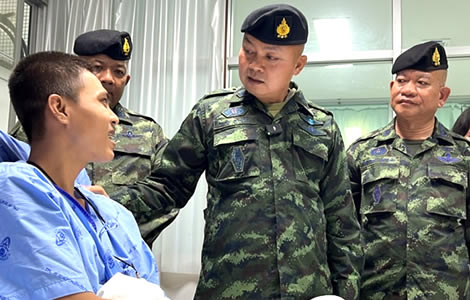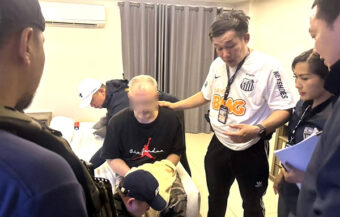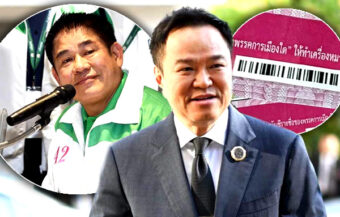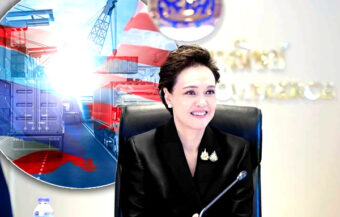Thai-Cambodian border tensions escalate as 2nd Army Commander Boonsin visits soldiers maimed by landmines, unveils new defensive tactics using machinery, drones and surveillance. He vows protection over offence amid fears of repeat deadly clashes and civilian exposure.
Thailand’s 2nd Army Commander, Lieutenant General Boonsin Padklang, on Wednesday visited soldiers injured on Sunday near Sisaket. He outlined new measures: deploying machinery and changing tactics to protect troops after landmine blasts that maimed soldiers. Border tensions are rising. Fears are growing of a repeat of the July 24–28 clashes, which killed 17 civilians and 15 soldiers. On Wednesday, Cambodia warned of heavy Thai troop movements and threatened imminent attacks on its positions.

Ubon Ratchathani, Thailand – On Wednesday, Lieutenant General Boonsin Padklang, Commander of the 2nd Army Area, visited soldiers wounded in the latest landmine incident along the Thai-Cambodian border.
The visit occurred at Sapphasitthiprasong Camp Hospital, 22nd Military Circle, Warin Chamrap District. Lt. Gen. Boonsin personally assessed the conditions of three soldiers injured while patrolling a high-risk zone on Sunday.
Most seriously affected was Sergeant Major First Class Thani Paha, a squad leader in the 111th Company, 16th Infantry Regiment. He stepped on a PMN-2 landmine while patrolling a route between Ban Don Ao and Ban Kritsana in Kantharalak District, Sisaket Province. Consequently, his lower left ankle was severed. Doctors report his condition has significantly improved, with only minor pain remaining.
Privates Chaiyasura and Kraiwong recover as military emphasises machinery and surveillance use
Additionally, Lt. Gen. Boonsin visited Private Phakphum Chaiyasura, a rifleman injured by shrapnel in his left arm and back, and Private Thanachai Kraiwong, who suffered an eardrum injury from the blast. Fortunately, both are recovering steadily with their families present.
During the visit, Lt. Gen. Boonsin emphasised the importance of reducing human risk in dangerous border areas. “We must not rely on soldiers walking through mined zones,” he said. “Instead, we will use machinery and surveillance systems.”
Thai military experts have confirmed that the PMN-2 landmines were newly manufactured and of Russian origin. Furthermore, evidence shows they were deliberately placed near patrol routes by Cambodian forces.
The 2nd Army Area Commander immediately ordered a shift in operational strategy. From now on, soldiers will rely on long-range surveillance, drones and machinery instead of foot patrols in high-risk areas. These measures aim to reduce casualties while maintaining border security.
Operational strategy now prioritises protection over engagement following deadly border clashes
Consequently, operational strategy now prioritises protection over engagement. Lt. Gen. Boonsin explained, “At this stage, our focus is on safety, not offence.”
The landmine incident follows four days of deadly attacks along the Thai-Cambodian border that targeted civilians. From July 24 to 28, Cambodian missile fire heavily impacted Sisaket Province. As a result, many people died. A total of 17 individuals were killed across all border provinces, with most fatalities occurring in Sisaket during a deadly attack on a shopping precinct.
Therefore, it is little wonder that on Monday night, many residents evacuated despite pleas from local authorities to remain calm.
Moreover, Lt. Gen. Boonsin plans to raise the landmine issue during the next General Border Committee (GBC) meeting. Thailand will propose that both sides adhere to international standards under the Ottawa Convention. Cambodia, like Thailand, is a signatory.
Cambodian reports claim Thai troop mobilisation while Bangkok stresses defensive positioning
Meanwhile, Cambodian media have reported alleged Thai preparations for offensive operations. Fresh News, citing unnamed sources, stated that the Thai army was mobilising troops and heavy weapons along the border. According to reports, the potential operation could occur on the night of August 13 or the morning of August 14.
In response, Thai authorities emphasise that these movements are precautionary. “Our forces are positioning defensively to prevent further casualties,” a Thai military source explained. “No offensive action is planned.”
Additionally, Cambodian reports mention that schools in Surin Province have been closed and students sent home to facilitate civilian evacuation. Fresh News claims that Thai military actions may violate ceasefire agreements reached on July 18 and August 7.
Despite these claims, Thai officials stress that all border actions are defensive. Furthermore, machinery, remote surveillance and controlled troop movements are intended to minimise human risk rather than provoke conflict.
Analysts warn landmine density and missile attacks heighten risk as military relies on technology
Analysts warn that dense landmine placement and missile attacks increase risks for both sides. Colonel Prasert Nimmala, a retired military strategist, said, “Any misstep could escalate the situation quickly. Caution is essential.”
Moreover, Thailand’s operational adjustments reflect broader strategic changes. The military is now relying more on technology than personnel in hazardous zones. This includes drones, remote-controlled vehicles and long-range monitoring systems.
Lt. Gen. Boonsin highlighted the significance of these innovations. “We must adapt to evolving threats while protecting our personnel and civilians,” he said. “The safety of soldiers is our highest priority.”
During the hospital visit, Lt. Gen. Boonsin also provided the injured soldiers with supplies and financial assistance for ongoing treatment. He praised their courage and dedication. “Our soldiers are extraordinary,” he said. “Their sacrifices will not be forgotten.”
Soldier welfare and diplomatic engagement remain central to Thailand’s border security plans
Sgt Maj Thani Paha’s recovery, alongside the rehabilitation of Privates Chaiyasura and Kraiwong, demonstrates Thailand’s commitment to soldier welfare. All three soldiers remain under medical care with family support at Sapphasitthiprasong Camp Hospital.
Furthermore, Thai authorities are coordinating with local leaders to maintain calm in border provinces. Residents are urged to remain alert and follow official instructions while military operations continue.
Thailand’s plan also includes formal diplomatic engagement. Officials will demand Cambodian compliance with international landmine standards at the next RBC meeting. The goal is to prevent further civilian and military casualties.
Although Cambodian media reports suggest possible Thai offensives, Thai authorities maintain that the military acts responsibly and defensively. Surveillance, remote machinery, and tactical repositioning aim to reduce injuries without escalating conflict.
Security experts emphasise that persistent provocations, including landmines and missile attacks, could trigger escalation. Dr. Anan Srisuk, a Southeast Asia security analyst, stated, “Clear communication and diplomacy are essential to avoid unintended clashes.”
Thai military remains committed to cautious defence while balancing technology and border safety
Nevertheless, Thai military sources remain committed to protecting the border. “We will continue to defend our territory while adhering to international norms,” Lt. Gen. Boonsin said. “Our strategy is cautious and measured.”
Of course, Thailand’s shift to technology-focused border security demonstrates a strategic commitment to soldier safety and civilian protection. While tensions remain high, authorities emphasise defensive preparedness rather than aggression.
The coming days will be critical. Both Thailand and Cambodia will monitor troop movements and border security closely. Authorities stress that the current focus is precautionary, designed to prevent further casualties from landmine incidents.
Soldier loses foot and 2 others injured by Cambodian PMN-2 landmine in Sisaket while on border patrol
Cambodia is using lethal Russian PMN2 landmines to subvert the Thai military’s composure on the border
Meanwhile, residents in Sisaket and Surin provinces remain alert. Local officials continue to coordinate evacuation plans and maintain communication with the military. Overall, the Thai Army’s approach signals a balance of caution, innovation and readiness.
Lt. Gen. Boonsin concluded his visit with a firm message: “We strengthen our defences, protect our people and uphold international law. Thailand acts responsibly and with caution.”
Join the Thai News forum, follow Thai Examiner on Facebook here
Receive all our stories as they come out on Telegram here
Follow Thai Examiner here
Further reading:
Charged situation – Defence chiefs from Thailand and Cambodia meet in Kuala Lumpur. ASEAN damaged
Fear on Eastern border under Martial law. Cambodian Bond nabbed on ฿162 a day from Phnom Penh regime
Cabinet meets after Cambodian ceasefire. Acting PM Phumtham spoke later with Trump for 30 minutes
Acting PM travels to Kuala Lumpur for ceasefire talks. Cambodia’s PM Hun Manet to attend amid PR war
Hot War rages on the Thai-Cambodian border following Cambodian troops offensive in Chong Bok area


















